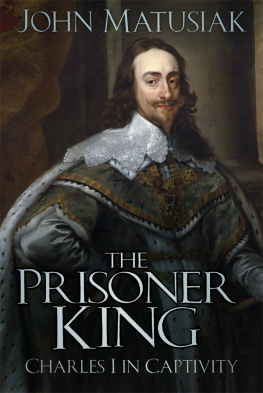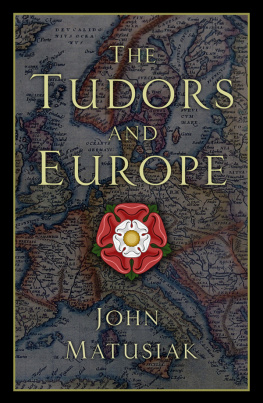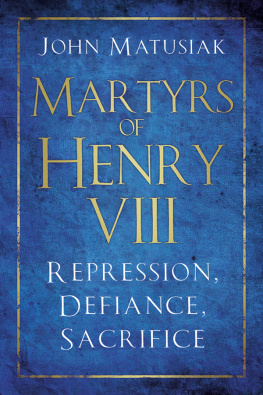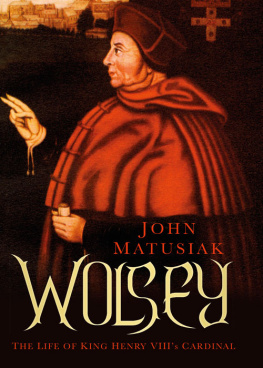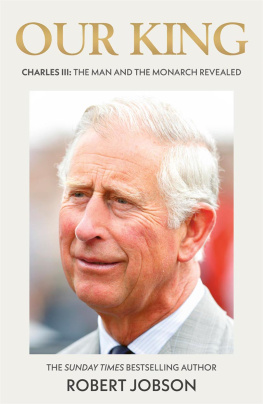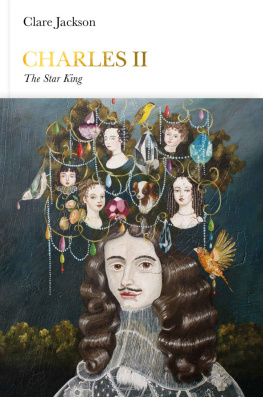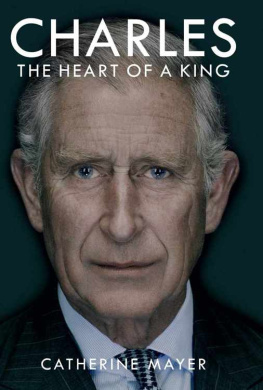John Matusiak - The Prisoner King: Charles I in Captivity
Here you can read online John Matusiak - The Prisoner King: Charles I in Captivity full text of the book (entire story) in english for free. Download pdf and epub, get meaning, cover and reviews about this ebook. year: 2017, publisher: The History Press, genre: History. Description of the work, (preface) as well as reviews are available. Best literature library LitArk.com created for fans of good reading and offers a wide selection of genres:
Romance novel
Science fiction
Adventure
Detective
Science
History
Home and family
Prose
Art
Politics
Computer
Non-fiction
Religion
Business
Children
Humor
Choose a favorite category and find really read worthwhile books. Enjoy immersion in the world of imagination, feel the emotions of the characters or learn something new for yourself, make an fascinating discovery.
- Book:The Prisoner King: Charles I in Captivity
- Author:
- Publisher:The History Press
- Genre:
- Year:2017
- Rating:5 / 5
- Favourites:Add to favourites
- Your mark:
- 100
- 1
- 2
- 3
- 4
- 5
The Prisoner King: Charles I in Captivity: summary, description and annotation
We offer to read an annotation, description, summary or preface (depends on what the author of the book "The Prisoner King: Charles I in Captivity" wrote himself). If you haven't found the necessary information about the book — write in the comments, we will try to find it.
The Prisoner King: Charles I in Captivity — read online for free the complete book (whole text) full work
Below is the text of the book, divided by pages. System saving the place of the last page read, allows you to conveniently read the book "The Prisoner King: Charles I in Captivity" online for free, without having to search again every time where you left off. Put a bookmark, and you can go to the page where you finished reading at any time.
Font size:
Interval:
Bookmark:


For Bella and Genevieve
First published 2017
The History Press
The Mill, Brimscombe Port
Stroud, Gloucestershire, GL5 2QG
www.thehistorypress.co.uk
John Matusiak, 2017
The right of John Matusiak to be identified as the Author of this work has been asserted in accordance with the Copyright, Designs and Patents Act 1988.
All rights reserved. No part of this book may be reprinted or reproduced or utilised in any form or by any electronic, mechanical or other means, now known or hereafter invented, including photocopying and recording, or in any information storage or retrieval system, without the permission in writing from the Publishers.
British Library Cataloguing in Publication Data.
A catalogue record for this book is available from the British Library.
ISBN 978-0-7509-8504-8
Typesetting and origination by The History Press
Printed and bound in Malta by Melita Press
eBook converted by Geethik Technologies
God sees tis fit to deprive me of Wife, Children, Army, Friends and Freedom, that I may be wholly his, who alone is all.
Eikon Basilike
Another city Lost! Alas poor king!
Still future griefs from former griefs do spring!
Alexander Brome, 162066, Royalist poet
As the nearby clock of St Peters struck three mournful chimes in the early morning stillness of Monday, 27 April 1646, Oxfords East Gate was cautiously opened by the citys governor, Sir Thomas Glemham, to release three cloaked fugitives into the night. Among them was Dr Michael Hudson, most trusted of all the kings chaplains, and the long-serving courtier, John Ashburnham, who had previously represented Hastings in the Long Parliament, only to be discharged and disabled for remaining staunchly faithful to the Royalist cause when the time of reckoning duly arrived. The third, however, was an altogether more intriguing individual, whom Glemham self-consciously hailed as Harry as he bade his farewell, locked the gate once more and left the travellers to the darkly looming world beyond the city walls. Earlier that evening, in the presence of his cousin the Duke of Richmond, the locks and beard of this same Harry had been crudely lopped by his close friend Ashburnham, who, in response to the gravity of the occasion, had no doubt abandoned his familiar lively air. For Harry was none other than the sovereign master whom the courtier had served for eighteen years as Groom of the Bedchamber, and more latterly as Treasurer to the vanquished royal army, which now lay in tatters under the grinding onslaught of its enemies. Reduced to anonymity and finally taking his leave of Oxford in the guise of a Roundhead serving man, King Charles I ruler by the grace of God of England, Scotland, France and Ireland and Defender of the Faith thus rode over Magdalen Bridge, up Headington Hill and away from the previously safe haven that had succoured him as capital, headquarters and refuge since the early days of the English Civil War.
Only four years earlier, Englands second Stuart ruler had entered the same city to a hearty welcome, fresh from the field of battle at Edgehill, proudly accompanied by his three beloved sons and brandishing before him some sixty or seventy colours seized from his Parliamentary foes. At that time, Edward Hyde, Earl of Clarendon, described Oxford as the only city in England which the king held entirely at his devotion, but the broader enmity of the outside world appeared of little consequence as the mayor presented him with a bag containing 250, and the universitys deputy orator rendered praise and thanksgiving for his safe deliverance in suitably reverential tones. Taking up residence in Christ Church, as his foot soldiers found billets round about, King Charles could, it seemed, look forward to the future with not a little self-confidence as his budding military base and newly established Court steadily took shape. Before long, his cavalry headquarters was securely installed at Abingdon, the best and most trusted of his generals, Prince Rupert, was comfortably lodged at St Johns, and his privy council, too, was at business in Postmasters Hall opposite Merton College, where the Wardens lodgings were being carefully prepared for his French queen. Nine months later, moreover, when the indomitable Henrietta Maria finally arrived at her husbands side, flowers were strewn before her and she too was treated, amid loud acclamation, to a purse of gold from the citys mayor at the spot called Penniless Bench.
The queens arrival after a long and painful parting could not, indeed, have been anticipated more eagerly by her husband. For in August 1642, when the English Civil War finally erupted, she had found herself stranded at The Hague, fund-raising on the security of the royal jewels and attempting to persuade the Prince of Orange and King of Denmark to plumb their coffers liberally. For much of that time she had been unwell from toothache, migraines, coughs and colds and her negotiations had been anything but easy. The larger pieces of jewellery, in particular, were not only too expensive to be sold easily, but carried the additional liability for any potential buyer that they might later be reclaimed by Englands Parliament. In the event, the queen proved only partially successful, not only with items like the great collar which she believed carried some malediction, since no one would touch it but even the smaller pieces like Charles precious pearl buttons. You may judge, she wrote bitterly, now that they know we want money, how they keep their foot upon our throat. I could not get for them more than half of what they are worth. And, as if to seal the queens frustration, her existing unpopularity as a Catholic had been compounded by further accusations in news-sheets and pulpits alike that the popish brat of France was busy mortgaging the crown jewels to foreigners for no other reason than to buy guns for a religious conflict of her own design. If I do not turn mad, she had complained to her husband, I shall be a great miracle.
Nor had Henrietta Maria hesitated to harangue the king more personally when occasion demanded. She had come to England in 1625 at the age of 15, ignorant of the language and institutions of her new country, undermined by her greedy French entourage, blocked by the resplendent and seemingly almighty Duke of Buckingham and weighed down by instructions from the Pope to protect the Catholics of England. But by now, as her husband well appreciated, she was a force to be reckoned with. The town of Hull, she told him in her letters, must absolutely be had, since it was vital to have an east-coast port to which money, military supplies and letters could safely be sent. She pressed him, too, about the security of the code in which the couple were obliged to communicate: Take good care I beg you, and put in nothing which is not in my cipher. Once again I remind you to take good care of your pocket, and not let our cipher be stolen. And when news reached her of a possible accommodation with Parliament, she had reacted with the kind of vehemence that appeared to reduce her husband to shambling inconsequence. For the honour of God, trust not yourself to these people, she insisted. If you consent to this, you are lost.
Yet the queens conviction that she alone could stiffen her husbands backbone for you are no longer capable of protecting any one, not even yourself had done nothing to quell his ardour or curb, for that matter, his ongoing indulgence of her whims. When I shall have done my part, Charles assured her, I confess that I shall come short of what thou deservest of me. And when, on another occasion, there had been nothing from her in the weekly dispatch, he confided sadly how I would rather have thee chide me than be silent. Plainly, the kings unconditional love manifested itself all too often in what appeared to be a fawning self-deprecation, and in the process merely served to reinforce on his spouses part that unbending faith in the superiority of her judgement that might, in the words of the Venetian ambassador, do considerable mischief in the successful conduct of affairs. During her five-month return journey she had, after all, faced storms of unprecedented ferocity off the Dutch coast, and sustained her terrified ladies by assuring them that Queens of England were never drowned. Ultimately, indeed, it had taken three attempts before she landed at Bridlington in February 1643, and even then her trials were not over, for the small house in which she initially prepared to spend the night became the target of Parliamentarian ships, and she was compelled dressed just as it happened to take shelter in outlying fields and hedges for two hours while cannonballs, as she herself put it, were singing round us in fine style, and a serjeant was killed twenty paces from me. Thereafter, she returned to her lodgings, not choosing that they should have the vanity to say they made me quit the village, and calmly consumed her supper having taken nothing today but three eggs.
Next pageFont size:
Interval:
Bookmark:
Similar books «The Prisoner King: Charles I in Captivity»
Look at similar books to The Prisoner King: Charles I in Captivity. We have selected literature similar in name and meaning in the hope of providing readers with more options to find new, interesting, not yet read works.
Discussion, reviews of the book The Prisoner King: Charles I in Captivity and just readers' own opinions. Leave your comments, write what you think about the work, its meaning or the main characters. Specify what exactly you liked and what you didn't like, and why you think so.

